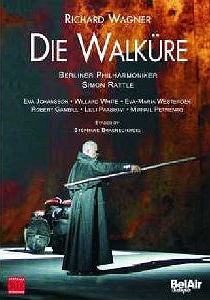BelAir Classiques has released a DVD
of a 2007 production of Die Walküre, filmed in HD at the Festival D’Aix en Provence, a co-production with Osterfestspiele Salzburg. While not an unwelcome addition to the numerous DVDs available of this work, it is certainly not an essential one.
This production is just not bad enough to be startling or shocking, and not nearly good enough to be fascinating or compelling. After two watchings, it seems to me… just okay. And Wagner should never be “just okay.”
There are two notable exceptions. Sir Simon Rattle leads a terrific performance from the Berliner Philharmoniker, emphasizing the lush romanticism of Act One, expressing beautifully the strange family dynamics of this brilliant act. He is equally remarkable in the heroic and passionate music of the final two acts, fiery climaxes merged with nuanced personal moments. Rattle manages a superb sense of propulsion, yet manages to linger on the psychologically telling moments of each character.
Would that the singing were at the same level. Only the wonderful Eva Maria Westbroek’s Sieglinde rises to the level of the orchestral work. She is the best Sieglinde of my experience—tremendously vulnerable, deeply passionate and singing gloriously. Her voice manages every moment of the role with ease and gleaming, silvery intensity. She is an excellent actress, even in close up; one can read Sieglinde’s inner thoughts clearly in her expressive eyes. Her singing is lush, warm, womanly, and rich of tone.
She is, unfortunately, ill matched with the Siegmund of Robert Gambill. While he has the requisite power, he has an annoying habit of starting notes sharp, then dropping into them like a car changing gears. He seems in extremis with the high notes, which are mainly shouted and sour. While the middle voice is strong and sometimes beautiful, I find his singing (and acting) crude here. Mikhail Petrenko’s Hunding, dressed like a businessman, is icily effective with his serial-killer eyes, but the voice is a size too small to make a major effect.
httpv://www.youtube.com/watch?v=lS1hdOXbd8s
Act Two finds Willard White’s Wotan inexplicably playing with toy soldiers that appear to be trying to kill a dragon (foreshadowing of Fafner?). White is an impressive physical presence, and clearly understands the internal workings of Wotan’s mind; still he cannot match his presence with the size of his voice. His is an intelligent, dignified interpretation, but he cannot fully express Wotan when his voice disappears into the orchestra on so many occasions. His dignity is also compromised by the stage director (Stephane Braunschweig). When Brunnhilde tells him Fricka is coming, he hides under the table. It’s a cheap laugh and completely out of character.
Eva Johansson is an appropriately coltish Brünnhilde, but her high notes throughout are curdled and shrill, and her facial expressions make Gloria Swanson’s worst excesses seem tame. Ms. Johansson has very large eyes, and she makes the mistake of making them even larger at every moment of emotion. Her Todesverkundigung scene comes to little effect, though she manages some truly touching moments in her Act Three humiliation.
Braunschweig’s production has a few interesting touches, but is mainly baffling. I liked seeing Wotan watching the meeting of the Walsung twins as if “setting it up”, and I particularly liked his handling of Fricka (Lilli Paasikivi, very well sung). No carping shrew here, this is a Fricka clearly in love with her husband and trying to bring him to the right path.
But there are numerous jarring moments in addition to those mentioned at the beginning of act two. When Siegmund pulls Nothung from the ash tree (actually it appears to be a stovepipe), he needs no effort whatsoever. As we arrive at “Siegmund heiss ich,” Sieglinde rushes offstage to the area where Wotan has been watching, pulls two white coats from mannequins, and dresses herself and her brother in them. The symbolism is either too heavy-handed or completely unclear. Worst of all is Brunnhilde being put to sleep on three red velvet chairs at the end of Act Three. The moment is completely bereft of magic or sentiment. The production is minimalist without being revelatory in any way.
This DVD is worth a look for the wonderful work of Rattle and Westbroek, who is certainly becoming the Wagner soprano of choice. I certainly look forward to her work in the upcoming operas of the Met’s new Ring.




